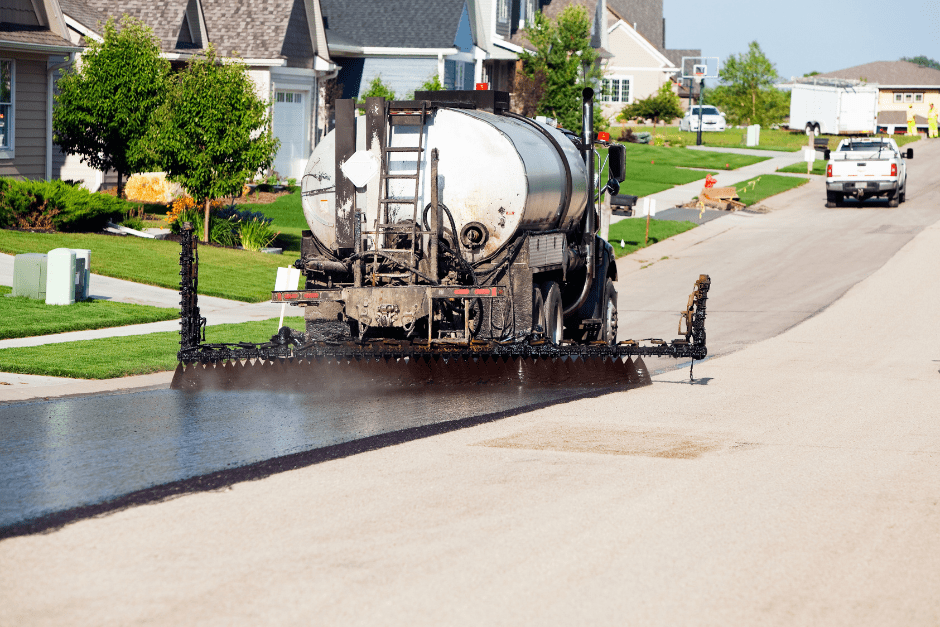SEALCOATING
Keep Your Asphalt Looking New
Read More About Sealcoating
REQUEST A QUOTE
We will have one of our representatives get in touch with you!
What is Sealcoating
Sealcoating is a protective layer that is applied over an asphalt surface in order to protect it from all of the different environmental factors that can cause an asphalt surface to age and deteriorate.
Once cured, sealcoating will not only restore the look of your asphalt but also renew the level of protection it receives. This can significantly expand the lifespan of your parking lot or other asphalt surface.

How Often Should You Sealcoat Asphalt?
Sealcoating is, essentially, preventative maintenance for asphalt. And like many kinds of preventative maintenance, it must be done periodically. Just like one oil change isn’t enough to keep your car running for the long haul, one sealcoating isn’t enough to keep your asphalt permanently in tip-top condition.
That is because while the sealcoating is protecting your asphalt from environmental factors by forming a membrane over it, those same factors are often affecting the seal coating.
A number of factors affect how often you will need to sealcoat your asphalt, including the type of sealcoating used and the age of the asphalt. An asphalt expert will be able to tell you exactly how often your surface will need to be sealcoated, but it usually ranges from every one to three years.
You can either pay to have your asphalt sealcoated periodically or you can pay much more later to replace the asphalt entirely.
What are the Types of Sealcoating?
While there are a few other types that have limited usage, often because of high costs, most sealcoating falls into one of two categories.
The first is coal tar asphalt emulsion. This sealcoating is fuel resistant, which is useful because fuel spills can soften the asphalt. It is also highly durable, a big plus for high-traffic parking lots.
The second is an asphalt emulsion polymer blend. The polymer-modified masterseal is both durable and environmentally friendly.
What Does Sealcoating Protect Against?
There are a number of environmental factors that can stress asphalt, making it brittle and prone to cracks. Sealcoating is designed to protect against these hazards.
Oxidation
Asphalt is designed to “flex” slightly under the weight of vehicles. When asphalt gets too brittle to flex, this becomes a significant problem.
That is the issue behind oxidation.
Like just about any organic substance, asphalt is prone to oxidation. The environmental oxygen reacts with the asphalt. These reactions cause an increase in polar oxygen-containing functional groups. These spur greater molecular interactions, which hardens the asphalt.
As the asphalt hardens, it loses some of the properties that make it such a durable surface. Suddenly, it is more prone to significant cracking.
It also affects the look of the asphalt, turning it a dull gray color.
Because sealcoating forms a protective layer over the asphalt, it can protect against the aging effects of oxidation, extending the lifespan of the surface.
Water Infiltration
As anyone who lives in the Midwest knows, water doesn’t just mean water. During the winter it means ice.
Water can infiltrate through small cracks in the surface of the asphalt. And during winter, where water seeps in, it will soon freeze. That freeze/thaw cycle breaks down the asphalt from the inside, deteriorating the condition of the surface.
Our sealcoating services solve this problem by stopping the cracks. First, we fix any larger cracks before the sealcoating process begins. The layer of sealcoating then also covers over any hairline cracks, eliminating the entrances that the water takes to get into the concrete.
If you want to reduce the ravages of winter on your asphalt, sealcoating is a good first step.
Aggregate Loss
What we know as asphalt is a mixture of bitumen with aggregate material such as sand, gravel or crushed stone.
Without sealcoating, asphalt can be prone to aggregate loss, reducing the strength of the surface.
Fuel Spills
Because of their chemical composition, gasoline has the effect of softening and weakening asphalt.
Sealcoating can help protect the asphalt from these kind of spills, minimizing the damage to your surface.
Our Sealcoating Process
Once we have verified that your pavement needs sealcoating, our team will get to work.
First, if there are any cracks, we will repair them so there are no defects that would prevent the sealcoating from forming a consistent barrier against the environmental factors that can weaken asphalt.
Then, we apply the emulsion over the pavement. It is then allowed to dry and cure. This procedure is usually done within a few mobilizations depending on the size and layout of your lot.
If the pavement is a parking lot or other surface that needs striping or painting, we can then stripe the lot.
This process not only protects your pavement and increases its longevity, but it also restores its look as well, with both the asphalt and painting looking new.
